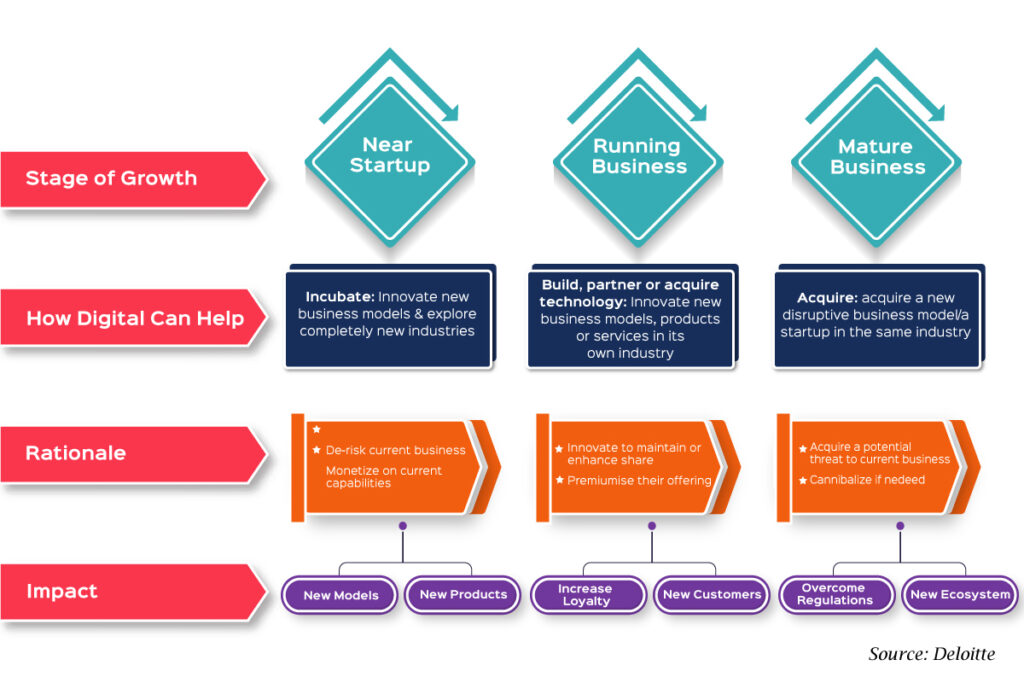
All SMEs whether they are Brick-and-mortar, Virtual, or Click-and-brick are getting disrupted by the impact of digital transformation(DX). Retail in particular is quite actively affected by numerous elements of digital transformation. Its significant impact on retail customer behavior has irreversibly changed the customers’ purchasing & decision-making patterns and models.
In fact, the IMD business school in its “digital tornado” model assumes that among the main industries, that will undergo digitalization in the next 5 years, will be technology products and services, media and entertainment, and retail. Looking at the penetration of DX in retail, it is lucrative for SME retailers to consider the possibilities of DX; but the journey to becoming digital is challenging for them.
SMEs usually have limited resources including finance, in-house knowledge, and management which reduces the capability of these organizations to respond to competition and market changes; however, they are dynamic, flexible, work closely with other people, more informal, and less bureaucratic than larger organizations along with other percepts as to get a productive digital transformation process.

Source: Deloitte
Challenges Retail SMEs face in their DX journey
Digital transformation plays a pivotal role in SMEs’ future and as they attempt to adopt the new technologies and innovative applications from digital transformation they face several challenges that need to be navigated to embrace digital transformation:
- Lack of digital tools & talent
- Financing difficulties
- Lack of change management & strategy
- Inefficient business processes
- Inadequate guidance and direction
- Unempowered business units
Small and Medium-Sized Enterprises (SMEs) Digital Transformation Process
Digital transformation along with organizational capabilities and resources can produce fundamental changes, particularly in how firms create and capture value; however many SMEs strive to upgrade their digital capabilities and embrace DX.
Firms can adopt this DX process to drive success.
Identify your current needs & define goals:
In retail, customer expectations evolve continuously, SMEs need to analyze their current situation needs to identify challenges, risks, or changing customer expectations. This will help to clearly define the measurable goals that can be reviewed by management to assess what technologies can contribute and explore new business models.
Adopt a learning culture:
When the world and society are changing at an unprecedented pace, it is crucial for SMEs to adopt a learning culture while embracing digital transformation. Critical analysis of the current capabilities and resources and aligning them with the current needs and goals can help detect the gaps.
Define a roadmap
A roadmap in terms of time, finances, responsibilities, skills, information technology, etc needs to be developed. However, several aspects related to expectations, competence, best practices, digital business model options, information technology use and understanding, digital value network, and feedback from customers need to be taken into consideration.
Create an awareness
Awareness regarding the efficient use of IT to develop the organization, measure the impact of IT tools, link expectations with the reality of apparent user-friendly IT turnkey platforms, be better informed about available IT training, and establish transparent communications between entrepreneurs and IT specialist is essential to avoid deception and meet the expectations from such initiatives.
Collaborate with experts
In order to fully harness the potential of digital transformation, it may be helpful for SMEs to consult with companies that have expertise in this field and obtain consultancy services. Experts can guide the SMEs through current trends and demonstrate the importance based on use cases.
Implement feasible objectives & evolve
Implement feasible objectives, and measure past efforts to refine. With the dynamic environment, it is essential to consider a methodology for continuous improvement that accommodates the needs of optimized and sustainable digital business models.
Also Read:
How Retailers Can Use Mobile Technology to Thrive During the Global Supply Chain Crisis
The tech-led behemoths like Amazon and Walmart are harvesting an ever-increasingly large share of the total retail market, making the future gloomy for traditional bricks-and-mortar retailers.
Impact of DX on SMEs
- According to Deloitte, companies that have higher digital maturity reported 45% revenue growth compared to 15% for lower maturity companies.
- A Mckinsey report reveals DX can reduce operational costs by 10-20%.
- Data-driven companies are 23x likely to acquire more customers, according to Mckinsey.
- 56% of organizations say that digital improvements and innovations have already increased profits- Tech Republic
DX puts SMEs in an excellent position to improve their productivity levels. While many SMEs have increasingly realized this, in many cases they still don’t know how to navigate the DX challenges, defining a robust strategy and following a well-structured process can increase the chances of success.
If you’re willing to jumpstart your digital transformation journey, we’d like to accompany and help you. Our seasoned experts have charted the digital transformation journey of SMEs like you. Get in touch now.


